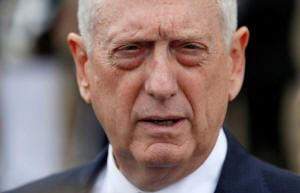|
US-USA-IMMIGRATION-BORDER-MILITARY
FILE PHOTO: Secretary of Defense Jim Mattis speaks with the
media before an enhanced honor cordon arrival of Greek Minister
of Defense Panagiotis Kammenos at the Pentagon in Washington
FILE PHOTO: Secretary of Defense Jim Mattis speaks with the
media before an enhanced honor cordon arrival of Greek Minister
of Defense Panagiotis Kammenos at the Pentagon in Washington,
U.S., October 9, 2018. REUTERS/Joshua Roberts/File Photo
Dimensions4460 x 2882
Size2.6MB
CreditReuters
Create New Collection
Item DetailsDownload
"The support that we provide to the secretary for homeland
security is practical support based on the request from the
commissioner of customs and border police, so we don't do stunts
in this department," Mattis said after a meeting with his South
Korean counterpart at the Pentagon.
Several groups including the American Civil Liberties Union have
accused President Donald Trump of politicizing the military
ahead of next week's midterm elections.
Trump has hardened his stance on immigration ahead of the Nov. 6
congressional elections. He has drawn attention to a caravan of
migrants that is trekking through Mexico toward the United
States as he seeks to fire up support for fellow Republicans in
campaign battles with Democrats who are trying to wrest control
of the U.S. House of Representatives and the Senate.
Republican lawmakers and other Trump supporters have applauded
the deployment. But critics say Trump is politicizing the
military, deploying them as a stunt to drive Republican voters
to the polls without any real national security threat.
"The move to send 5,200 active duty troops to the southern
border is a craven political stunt that sets a bad precedent and
is arguably an abuse of power," Kelly Magsamen, a former senior
Pentagon official, said. She is currently with the Center for
American Progress think tank.
The deployment will create an active-duty force comparable in
size to the U.S. military contingent in Iraq.
Trump's decision to call in the military appears to be a
departure from past practice. At least in recent years, such
operations were carried out by National Guard forces, largely
part-time military members often called upon in response to
domestic emergencies.
A U.S. official told Reuters that as of Wednesday the Pentagon
had identified about 7,000 active-duty troops, which included
about 2,000 on standby, that could be deployed to the border
with Mexico if needed.
On Tuesday, the top U.S. general overseeing a deployment of more
than 5,200 troops to the border said troop levels would rise
further, but declined to say how high or estimate what the
operation will cost.
Many basic questions remained unanswered days after the Pentagon
announcement, including the scope of the mission as well as the
Pentagon's assessment of any threat posed by arriving migrants.
(This version of the story has been refiled to fix garbled word
order in last sentence of paragraph 6)
(Reporting by Idrees Ali; Editing by Chizu Nomiyama and David
Gregorio)
[© 2018 Thomson Reuters. All rights
reserved.] Copyright 2018 Reuters. All rights reserved. This material may not be published,
broadcast, rewritten or redistributed.
Thompson Reuters is solely responsible for this content.

|
|







